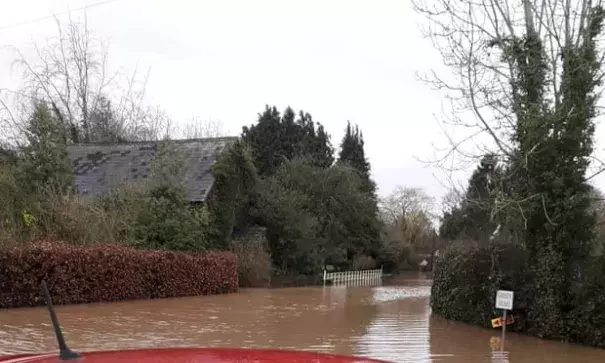'The worst thing is the waiting': flood-hit communities tell of stress

Climate Signals Summary: Climate change is increasing the frequency and intensity of extreme rainfall, and this increases the risk of flooding. People living in communities hit hard by flooding can experience immense stress and even develop PTSD.
Article Excerpt: Flooding not only wrecks businesses, destroys homes and disrupts everyday life but also causes long-lasting and dangerous levels of stress, residents from flood-hit communities have said.
Hundreds of homes have been flooded and six people are thought to have died across England and Wales after heavy downpours and successive storms further exposed the fragility of flood defences and the gravity of the climate emergency.
...
The scale of the flooding in Gillender’s village has been unprecedented and there are record levels of water in rivers nearby. She [Amanda Gillender, a 71-year-old Herefordshire resident] fears life there may become untenable if the climate crisis is not taken seriously. But for now, her most immediate concern is dealing with her insurance claim as she assesses the damage to her 500-year old cottage.
“The worst thing about flooding is the waiting and watching as the water rises foot after foot deep,” she said. “There’s nothing you can do. Once it has happened you’re completely isolated because you can’t go out and are left alone with the painful, disruptive aftermath.”
Elsewhere, the cumulative stress is having a grave impact on communities. “There are thousands of small human stories of stress, worry and disappointment,” said Rachel Buchanan, from the Ludlow area in Shropshire. “We’re all looking at river level websites now before going out. It just makes everyone a little less willing to leave their home.”
People are being prevented from getting to work and social events, caring for family members and attending to livestock, and are becoming ever more lonely, Buchanan believes.
“You become slightly more isolated as the effects of the flooding encroach on everyday life,” she said. “A friend of mine who is a single mother simply won’t go out now. Small businesses are losing a day or a week of work and the roads are crumbling – it’s a mess.”
...
In Surrey, where the Thames flooded twice in 2014, residents are still dealing with the consequences. “I don’t think we ever fully recovered from the experience,” said the fluid dynamicist and racing boat maker Carl Douglas. “It knocked the momentum out of us, left us poorer and messed up our business.”
Receiving an adequate payout from his insurers proved an “incredibly stressful” ordeal that he knows was not unique to himself, and in 2015 he developed circulatory problems that forced him to have a triple bypass operation.
“The surgeon looked at me and said: ‘You look pretty fit for your age so I wouldn’t have expected you to need this procedure. But have you been under a lot of stress?’ ‘Oh yes,’ I replied,” Douglas said.


